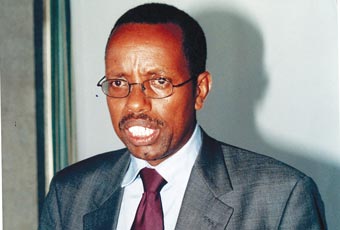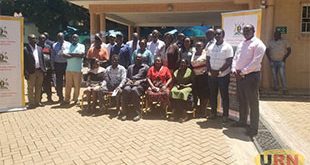
By Isaac Mufumba
The opposition is putting final touches to what it says is an alternative to Finance Minister, Syda Bbumba’s 2010/11 budget.
Shadow Minister for Finance, Oduman Okello told The Independent that the government has been borrowing at an alarming rate, has failed to implement much needed tax reforms, and got its priorities wrong. He says the “alternative budget” by the opposition will show how these failures can be corrected.
The opposition is concerned that in May 2010 alone, the government ran to parliament with eight different requests to borrow money in the region of US$800 million (approx. Shs1.8 trillion).
On May 6 parliament allowed government to borrow US$100 million from Japan to fund the procurement of road making equipment and fire engines for distribution to the districts.
On May 18, the Chairperson of the parliamentary committee on the National Economy, Stephen Birahwa Mukitale, stampeded parliament into receiving and adopting seven different reports that paved way for the borrowing of more than US$650 million.
The government sought to borrow US$10 million and another US$9.7 million from the African Development Bank and the Islamic Development Bank to finance the rural income and employment enhancement project; US$3.5 million from the Japanese International Cooperation Agency (JICA) to upgrade the Atiak-Nimule road; US$55 million from JICA to co-finance the interconnection of electric grids of the 5 Nile equatorial lake countries; and US$13.57 million from the Islamic Development Bank for expansion and development of technical colleges.
Others loans sought were US$12,700,000 and another US$22,950,000 from the Saudi Fund for Development and the OPEC Fund for International Development to equip 14 technical institutes; US$567 million to enable Islamic University in Uganda complete students hostels; US$10 million from the Kuwait Fund For Arab Development and to guarantee the borrowing by the Uganda Development Bank (UDB) of US$10 million from the Islamic Development Bank for lines of credit for the UDB.
“They are in overdrive in terms of borrowing. This is the highest ever rate of borrowing in the last four years,” says Shadow Minister of Finance, Oduman Okello.
Ironically, Stephen Birahwa who presented the reports is the chairperson of the Parliamentary Committee on National Economy that in Feb. released a report warning about the rising debt burden.
The committee noted that the rate at which government was borrowing was not in equanimity with development in sectors such as roads, health, agriculture and education.
State Minister of Finance Fred Omach also recently wrote to the Committee on the National Economy warning that “Our debt is steadily rising and, at the current trend, it would tend to reach unsustainable levels by 2012.”
The borrowing spree comes at a time when donor funding for both projects and budget support has been cut by more than Shs442.1 billion. Funding is to reduce from Shs1.25 trillion last year to Shs814.5 billion next year.
The Uganda Revenue Authority has also declared shortfalls of more than Shs2 billion in revenue collections for the 2009/10 financial year and the budgets of several ministries have been slashed.
Most of Uganda external debt was cancelled when the country became one of the first beneficiaries of the Heavily Indebted Poor Countries Debt (HIPC) Relief initiative. At the time, the World Bank said Uganda’s debt burden had become unsustainable and would undermine Uganda’s future growth.
Prior to the cancellation, Uganda’s foreign debt stood at about US$4.7 billion in 2005, but with the cancellation, fell to just US$1.1 billion in June 2006.
According to figures from the Uganda Debt Network, Uganda’s foreign debt had by the end of June 2007 risen to US$1.47, before rising to US$1.99 billion in November 2008.
By March 2009, it had risen to US$4 billion, but had reached the US$5.7 billion mark by the end of August 2009, which is the latest figure available.
Prof. Edward Kakonge of the Uganda Debt Network says that the amount has slightly reduced by about a billion dollars, but questions the debt servicing strategy.
“They keep on paying the interest but not the principle. That makes it fluctuate a bit but does not help to clear the debt,” he says.
Critics have since argued that the country did not really benefit from the debt relief because most of the saving was either used in wasteful expenditure on the military or was lost to corruption.
“Offshoots from HIPC should have been seen in poverty reduction but where is the impact?” Oduman Okello asks.
Okello says that slackening rates of growth as seen in the drop from 7% in the 2008/09 financial year to 5.4% in the 2009/10 financial year coupled with the increasing debt are putting Uganda’s economy in a precarious situation.
Okello is unhappy that the government has not implemented recommendation by parliament to introduction of a stimulus package and the implementation of major tax reforms.
But Deputy Secretary to the Treasury Keith Muhakanizi defends the borrowing saying it is for strategic areas of the economy.
“The debts fall within the government’s debt sustainability strategy,” he told The Independent.
The Budget Framework Paper FY2009/2010 says “as empirical evidence suggests, the volume of debt in itself is not a problem but the capacity to repay the debt in the long term without overly constraining other priority expenditure programs.”
Donors too, do not seem to be perturbed by what the public borrowing spree.
“They (Government) have been borrowing increasingly, but not excessively. We are not concerned at this moment”, the Senior Resident Representative of the IMF, Thomas Richardson, told The Independent.
 The Independent Uganda: You get the Truth we Pay the Price
The Independent Uganda: You get the Truth we Pay the Price



